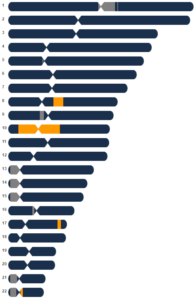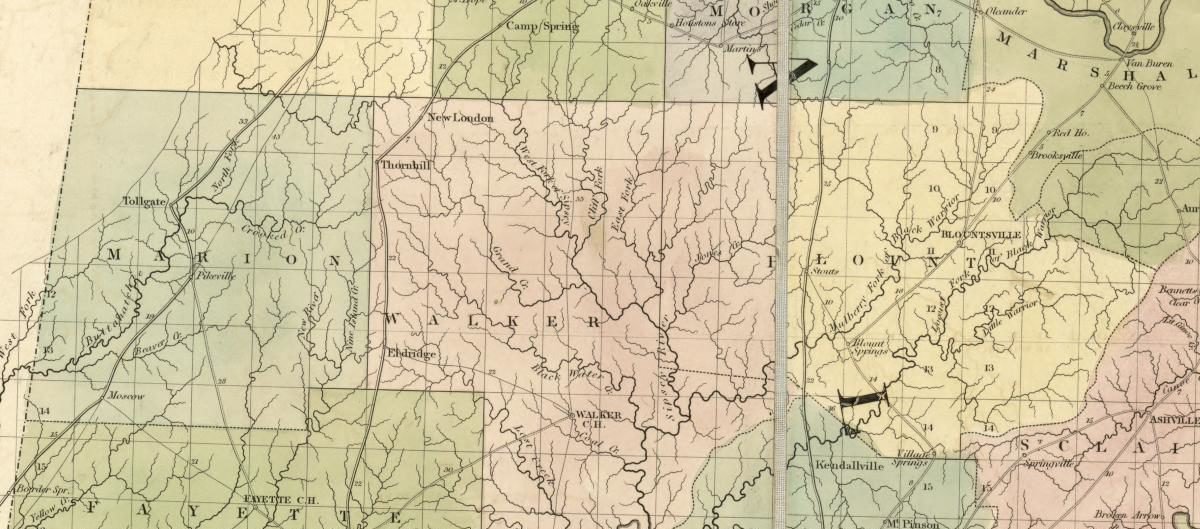Y-DNA
We entered the field of DNA genealogy in August 2007, when our cousin, Michael Robert (Mike) Dutton asked for our help in proving his descent from the Duttons of Charles County, Maryland. We claimed descent from Thomas Dutton, born ca. 1660, who married Elizabeth Hill, and since he believed his ancestor, George Washington Dutton (1829-1913), who ended up in nearby Washington, D.C., hailed from Charles County, Maryland, it seemed natural to compare our DNA. We first conducted Y-DNA tests on Mike and on several confirmed patrilineal descendants of Zachariah Dutton. Our first results, however, were disappointing.
Not Descended Patrilineally from Duttons
When the tests came back, Mike Dutton tested as haplogroup R1b, the most common grouping of Western European or British ancestry, confirming what we expected of the commonly English surname Dutton — but the problem was, our Zachariah Dutton descendant didn’t match Mike. Zachariah Dutton’s descendants were instead haplogroup E1b1b (E-M215), a grouping showing North African, Middle Eastern, or Eastern European ancestry. This indicated, first of all, that Mike Dutton and Zachariah Dutton’s descendants do not share a common patrilineal ancestor! One or the other of us was mistaken, it seemed, about who we descended from. Since Mike had no direct documentation connecting his ancestor to parents in Charles County, and we had no direct documentation connecting Zachariah Dutton to any parents at all, the answer was not immediately clear.
It was not until two years later, when we found another confirmed descendant of Thomas Dutton of Charles County, Maryland, to test, that this question was answered definitively. The new Dutton matched Mike: Mike was confirmed as a patrileal descendant of Thomas Dutton; we were confirmed not to be. Zachariah Dutton’s father was apparently not a Dutton. Zachariah was, as we had speculated he might be, illegitimate, adopted, or the result of some other non-paternity event.
New Directions in Y-DNA
Who was Zachariah Dutton’s father, if not a Dutton? Since we did not seem to have definitive Y-DNA matches with any other families that were present in Charles County, Maryland, around the time of Zachariah’s birth, we appeared to be at a dead end for now. Recently, there have been a two areas in which Y-DNA has again offered promise:
- Possible non-paternity events: Several family lines have been brought to my attention who appear very strongly, due to both DNA and geographic proximity, to be descended from Zachariah Dutton, but who are not named Dutton: apparently they are the result of illegitimate children fathered by Dutton men or who otherwise came to adopted by other families. Among these families are the descendants of William Henry Harris (born ca. 1797 in Campbell County, Virginia) Jones Allen (born 1816 in Henry County, Virginia), and Alexander Watts (born 1809 in Alabama or Tennessee).
- Advanced SNP testing: SNPs (Single Nucleotide Polymorphisms) are rare mutations that occur in a DNA sequence and can be used for studying deep ancestry or confirming matches. We are currently (January 2017) conducting an SNP panel on a Zachariah Dutton Y-DNA test. This should give us a clearer idea of the population group Zachariah Dutton’s biological father may have belonged to, and give us some insight into whom to look for.
Y-DNA Results
For complete Y-DNA results, including all identified Dutton lineages worldwide, see the DUTTON Surname Project at Family Tree DNA.
Autosomal DNA

We conducted our first autosomal (Family Finder) tests in 2011. We first tested two great-great-grandchildren of Zachariah, one from an Alabama branch and one from a North Carolina branch, who should have had no other ancestors in common but Zachariah Dutton and his wife. These tests confirmed our family connection, and finding matches that the two testers had in common, we were able to identify some additional Dutton cousins. We made contact with several branches of the family we had not seen tested yet. Of particular note, we identified descendants of Zachariah Dutton, Jr., one of Zachariah Dutton’s “long-lost sons.”
We Are Duttons After All
Perhaps the most important result of autosomal testing is that we did discover autosomal matches between Zachariah Dutton descendants and Mike Dutton and other descendants of the Charles County Duttons. This means that Zachariah Dutton was a Dutton after all: it’s just that his father wasn’t. In all likelihood this means that Zachariah’s mother was a Dutton, and that he was illegitimate. We know that we do have a connection to the family of Thomas Dutton of Charles County, Maryland, whose ancestry we believe extends back to the original Duttons of Cheshire, England.
For the future with autosomal DNA, I envision three primary objectives for autosomal testing:
Mapping Zachariah’s Chromosomes

Chromosome mapping is a technique for mapping which segments of each chromosome are inherited from which ancestor. By matching what segments of DNA each Zachariah Dutton descendant shares with each other, we can gradually identify segments that belonged to Zachariah Dutton or his wife, and with some deeper analysis, actually recreate Zachariah Dutton’s chromosomes.
I loosely estimate, from mapping the chromosomes of my four great-aunts and great-uncles who tested, that they cover about 10 percent of the range of chromosomal segments. Since these are half-matches — that is, since every gene is a pair alleles, and a child only inherits one from each parent — so we half that number in half; and cut it in half again since each allele inherited from the Dutton line might have belonged to either Zachariah Dutton or his wife. All in all, we haven’t identified very much yet. But among the nearly two-dozen Zachariah Dutton descendants who have tested, we may be able to identify more with work. This is why more participants are needed, and from as many branches of the family as possible!
Matching As Many Cousins As Possible
The more of the chromosomes of Zachariah Dutton and his wife we map, the greater chance we have of matching with cousins who might hold missing pieces of our puzzle: who might be kin to the family of Zachariah Dutton’s biological father and help us identify him, or kin to the family of his wife and help us identify her. This is because these cousins might hold pieces of Zachariah’s chromosomes we haven’t acquired or identified yet.
DNA genealogy is the frontier of genealogy. Using it, researchers have been able to break through brick walls and make connections across the ages. That is what we ultimately aim to do with the Zachariah Dutton DNA Project.
